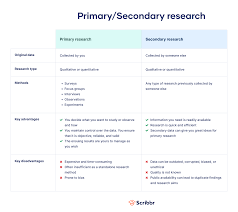Exploring the Significance of Primary Research in Academic Investigations

The Importance of Primary Research in Academic Studies
Primary research plays a crucial role in academic studies by providing firsthand information and data that is original and directly collected from reliable sources. This type of research involves gathering new data through methods such as surveys, interviews, experiments, and observations.
One of the key benefits of primary research is its ability to offer unique insights into a particular topic or issue. By conducting primary research, researchers can tailor their studies to specific objectives and gather information that is not available elsewhere. This originality and specificity contribute to the richness and depth of academic work.
Moreover, primary research allows researchers to control the data collection process, ensuring the quality and accuracy of the information gathered. Researchers can design their studies according to rigorous methodological standards, thereby enhancing the credibility and reliability of their findings.
Another advantage of primary research is its potential for innovation and discovery. Through direct engagement with subjects or phenomena, researchers may uncover new patterns, trends, or relationships that can advance knowledge within their field. This element of exploration adds value to academic studies by pushing boundaries and generating fresh perspectives.
Furthermore, primary research promotes critical thinking skills among researchers as they navigate the complexities of data collection, analysis, and interpretation. By actively engaging with primary sources, researchers develop analytical abilities that are essential for academic inquiry and intellectual growth.
In conclusion, primary research is a fundamental component of academic studies that offers numerous benefits to researchers and scholars. Its emphasis on originality, specificity, control, innovation, and critical thinking contributes to the advancement of knowledge across various disciplines.
Six Essential Tips for Conducting Effective Primary Research: A Guide to Objectives, Methods, and Ethics
- Clearly define your research objectives before starting.
- Choose appropriate research methods such as surveys, interviews, or observations.
- Ensure your sample size is representative of the population you are studying.
- Collect data systematically and accurately to maintain reliability.
- Analyse the data carefully to draw meaningful conclusions.
- Consider ethical considerations when conducting primary research.
Clearly define your research objectives before starting.
It is essential to clearly define your research objectives before embarking on primary research. By establishing specific goals and outcomes at the outset, researchers can focus their efforts and ensure that their study remains targeted and purposeful. Clear research objectives help guide the data collection process, inform methodological choices, and shape the analysis and interpretation of findings. This initial clarity not only enhances the quality and relevance of the research but also aids in maintaining a structured approach throughout the study, ultimately leading to more meaningful and impactful results.
Choose appropriate research methods such as surveys, interviews, or observations.
When conducting primary research, it is essential to select suitable research methods, such as surveys, interviews, or observations. Choosing the right method is crucial as it determines the type of data collected and the depth of insights gained. Surveys are effective for gathering quantitative data from a large sample size, while interviews allow for in-depth exploration of individual perspectives. Observations provide firsthand information about behaviours or phenomena in their natural context. By carefully selecting appropriate research methods, researchers can ensure the reliability and validity of their findings in academic studies.
Ensure your sample size is representative of the population you are studying.
When conducting primary research, it is essential to ensure that your sample size is representative of the population you are studying. A representative sample accurately reflects the characteristics and diversity of the larger population, increasing the validity and generalizability of your findings. By carefully selecting participants that mirror the demographics and key traits of the population, researchers can draw more reliable conclusions and make meaningful contributions to their field of study.
Collect data systematically and accurately to maintain reliability.
To ensure the reliability of primary research, it is essential to collect data systematically and accurately. By following a structured approach to data collection, researchers can maintain consistency and coherence in their findings. Systematic data collection helps to minimise errors and bias, ensuring that the information gathered is reliable and trustworthy. Accuracy in data collection is crucial for drawing valid conclusions and making informed decisions based on the research findings. Therefore, researchers must adhere to rigorous methods and procedures when collecting data to uphold the integrity and reliability of their primary research.
Analyse the data carefully to draw meaningful conclusions.
When conducting primary research, it is essential to analyse the data meticulously to draw meaningful conclusions. By carefully examining the collected information, researchers can uncover patterns, trends, and relationships that provide valuable insights into the research topic. Thorough data analysis allows researchers to make informed interpretations and draw valid conclusions based on evidence. This process not only enhances the credibility of the study but also contributes to the overall quality and impact of the research findings.
Consider ethical considerations when conducting primary research.
When conducting primary research, it is essential to carefully consider ethical considerations throughout the research process. Ethical considerations involve ensuring that the rights, privacy, and well-being of participants are respected and protected. Researchers must obtain informed consent from participants, maintain confidentiality of data, and minimize any potential harm or risks associated with the research. By prioritizing ethical considerations, researchers uphold the integrity and credibility of their study while demonstrating a commitment to upholding ethical standards in academic research.
